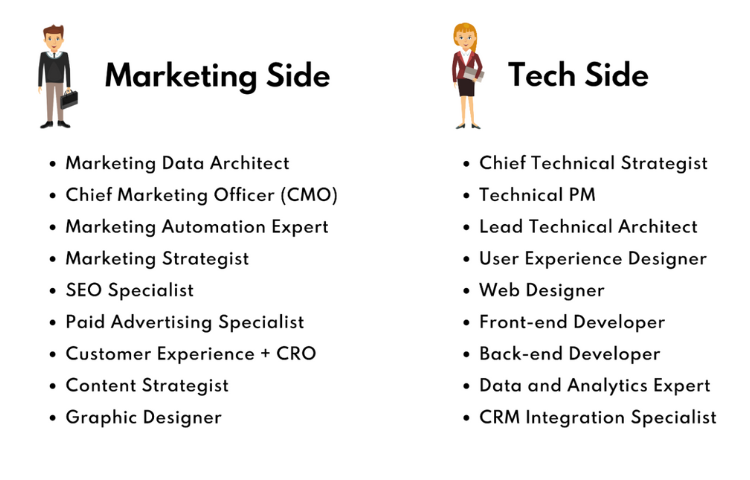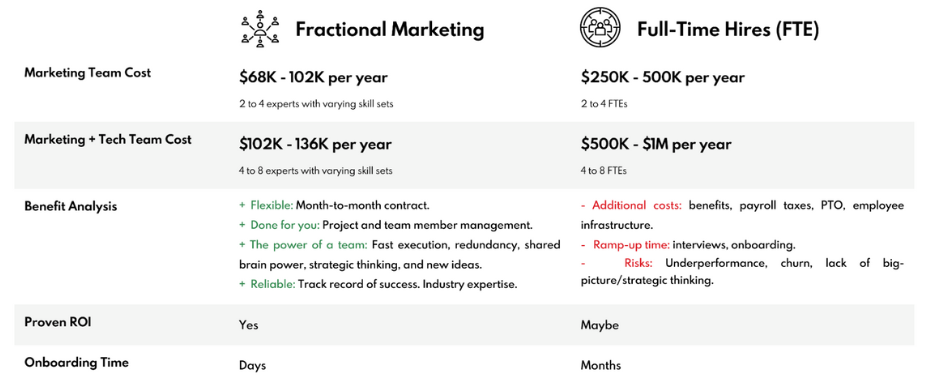
- Summary
- What is a Fractional CMO?
- Hiring Options for Fractional Resources: Ranked from Least to Most Powerful
- When Should You Hire a Fractional CMO?
- When Not To Hire a Fractional CMO
- When Not To Hire Any CMO Whatsoever
- When To Hire a Fractional Marketing Team + Embedded CMO
- Fractional CMO Roles and Responsibilities
- Fractional CMO vs Full-Time: The Advantages
- How Much Does a Fractional CMO Cost?
- Get CMO-like Leadership Without the Full Time Expense
Fractional Chief Marketing Officers (CMOs) bring executive-level marketing expertise to a company on a part-time or contract basis. They can play a crucial role in shaping and driving the strategic marketing direction of the company without the full-time commitment or cost associated with a permanent CMO, for which one can spend upwards of $300,000 annually.
A fractional CMO is more than cost-effective leadership. For a fraction of the cost and commitment of a typical CMO, you also get cross-industry experience and perspectives. These professionals are equipped to do more with fewer resources so that you can grow rather than simply maintain the status quo.
Assuming you need one, a fractional CMO can offer many advantages to a more expensive full-time CMO. We’ll delve into this and more below.
What is a Fractional CMO?
A fractional Chief Marketing Officer (CMO) is an experienced marketing professional and high-level executive who offers their expertise to a company on a part-time or contract basis. Unlike a full-time CMO, a fractional CMO is not an everyday presence in the office. Instead, they provide strategic guidance, oversight, and leadership in the marketing realm for a fraction of the time—and cost—of their full-time counterparts.

This role is ideal for organizations that need senior marketing leadership but are not yet in a position to afford or require a full-time executive. Fractional CMOs bring a wealth of experience and an external perspective that can be crucial for companies looking to innovate or refine their marketing strategies without the overhead associated with a full-time position.
The main attractions of hiring a fractional CMO include:
- Flexibility: Companies can scale their marketing leadership up or down based on current needs without committing to a permanent overhead.
- Access to Expertise: Fractional CMOs often have diverse backgrounds with experience across various industries and markets, providing them with a broad perspective and specialized skills that might not otherwise be accessible.
- Cost Efficiency: Businesses can leverage the insights and strategic capabilities of a seasoned marketing executive without the full-time salary, benefits, and other compensations typical for a C-suite position.
In essence, a fractional CMO serves as a strategic partner, helping businesses align their marketing strategies with broader business objectives, thus driving growth and enhancing brand positioning in the market. This model not only supports businesses in navigating the complex digital landscape but also ensures that their marketing efforts are both innovative and grounded in industry best practices.
Hiring Options for Fractional Resources: Ranked from Least to Most Powerful
Businesses have several options when it comes to structuring their marketing leadership and teams. Each option offers different benefits and suits various business needs, sizes, and stages of growth. Understanding these can help companies make informed decisions that align with their strategic objectives and budget constraints.
Here are the four primary hiring options, ranked from least to most powerful in terms of strategy, outcome, cost, and execution:
Option #1 (Least Powerful): Hiring a Fractional CMO
Benefits:
- Cost-Effectiveness: A fractional CMO provides the expertise of a senior marketing executive without the full-time salary and benefits package.
- Flexibility: Businesses can adjust the fractional CMO’s hours based on their evolving needs, making this a flexible option that scales with the company’s growth.
- Strategic Focus: Fractional CMOs typically bring years of experience and a strategic viewpoint, helping to steer the company’s marketing efforts at a high level without delving into day-to-day operations.
Best For:
Companies that need strategic marketing guidance but are not ready or able to commit to a full-time executive due to budget constraints or current business size.
Option #2: Hiring a Full-Time CMO
Benefits:
- Dedicated Leadership: A full-time CMO can fully immerse themselves in the company, potentially offering deeper insights into the business and a more personalized marketing strategy.
- Continuity and Commitment: Having a full-time CMO allows for consistent leadership, which can be crucial for companies with complex marketing needs or those in highly competitive industries.
- Cultural Integration: A full-time executive is generally better able to integrate into a company’s culture and work closely with other departments, fostering a cohesive brand identity.
Best For:
Larger businesses or those at a stage where the scale of operations justifies and necessitates a dedicated full-time marketing leader.
Option #3. Hiring a Fractional Marketing Team without a Fractional CMO
Benefits:
- Diverse Skills: This approach allows businesses to access a wide range of marketing skills from different professionals via a fractional marketing team, each bringing expertise in specific areas such as digital marketing, content creation, or data analytics, as well as CMO-like leadership, experience, and skillsets.
- Scalability: Just like with a fractional CMO, the involvement of the team can be scaled up or down based on the company’s needs, offering great flexibility.
- Cost Efficiency: Businesses can avoid the overhead of full-time salaries while still covering all necessary marketing functions.
Best For:
Startups and small to medium-sized businesses that require comprehensive marketing services but (1) have someone who fulfills most of a CMO's responsibilities, or (2) do not need or cannot afford a CMO.
Option #4 (Most Powerful). Hiring a Fractional Marketing Team with an Embedded Fractional CMO

Benefits:
- Integrated Strategy, Execution, and Team Dynamics: Combining a fractional CMO with a fractional team ensures that strategy, execution, and team dynamics are tightly aligned, with the CMO providing strategic oversight and the team supporting the strategy and execution.
- Streamlined Account Management and Risk Reduction: One significant advantage of this approach is streamlined account management. The service provider acts as a single point of contact for all marketing needs, simplifying communication and coordination. This way, you're not putting all of your eggs in one basket — if the CMO ends up not being the right fit, you have business continuity, an existing team with brand and project context, and a fast path to replacement.
- Checks and Balances: A fractional marketing team offers checks and balances to the strategies proposed by the fractional CMO. With diverse expertise and viewpoints within the team, strategies can be vetted and refined collaboratively, ensuring a more robust and effective marketing approach.
Best For:
Businesses that need both strategic direction and a variety of executional capabilities but are not in a position to hire a full-time CMO and marketing team.
Each of these hiring options serves different business needs and offers distinct advantages. The choice between them depends on factors such as the company’s stage of growth, industry, budget, and specific marketing challenges. By carefully considering these elements, businesses can select the optimal marketing leadership and team structure to propel their growth and achieve their strategic goals.
When Should You Hire a Fractional CMO?
In our experience working with fractional CMOs, placing them for clients, and filling in the role ourselves, we believe the following are signs pointing to the need to hire a fractional CMO:

- Stagnant or Declining Growth: If a business’s growth has plateaued or is declining, and internal efforts have not successfully reversed the trend, a fractional CMO can bring fresh perspectives and strategies to reinvigorate the marketing approach and drive growth.
- Marketing Expertise Gaps: Small to mid-sized businesses often lack specialized marketing knowledge, particularly in digital marketing, branding, or market analysis. A fractional CMO brings this expertise to fill those gaps, crafting strategies that align with the latest market trends and consumer behaviors.
- Upcoming Major Projects or Campaigns: Launching new products, entering new markets, or undertaking significant rebranding efforts are complex projects that can benefit from the seasoned guidance of a fractional CMO, who can oversee these projects and ensure alignment with broader business goals.
- Budget Constraints: For businesses operating with tight budgets, hiring a full-time CMO with a competitive salary and benefits package might not be feasible. A fractional CMO provides a cost-effective alternative, offering top-level expertise without the long-term financial commitment.
- Need for Scalability: Businesses experiencing rapid growth or facing seasonal fluctuations might find it challenging to scale their marketing efforts accordingly. A fractional CMO can strategically manage scaling up or down as needed, adapting marketing efforts to current business conditions.
- Lack of Strategic Direction: If a business lacks a clear, coherent marketing strategy or if the existing strategy isn’t aligned with its long-term vision, a fractional CMO can help define and direct strategic marketing efforts that are integrated with the company's overall objectives.
- Desire for an External Perspective: Sometimes, internal teams are too close to the problem to see the solution. A fractional CMO brings an objective, external perspective that can challenge the status quo and introduce innovative solutions and processes.
- Rapid Technological or Market Changes: In industries where market conditions and technologies evolve rapidly, keeping up can be challenging. A fractional CMO, with experience across various sectors and up-to-date on the latest marketing innovations, can guide a business through these changes effectively.
- Leadership Transitions: During periods of leadership change or restructuring, a fractional CMO can provide continuity and stability to the marketing department, ensuring ongoing projects and strategies are not disrupted.
Recognizing these signs can help businesses determine the right time to consider engaging a fractional CMO, thereby harnessing expert marketing leadership tailored to their specific needs and budget.
When Not To Hire a Fractional CMO
While the benefits of hiring a fractional CMO are numerous, there are certain circumstances in which this arrangement might not be the best fit for a company. Understanding when not to hire a fractional CMO can help businesses avoid misalignments that could hinder their growth and operational effectiveness. Here are some key scenarios where a full-time CMO or another solution might be more appropriate:
- Need for Daily Operational Involvement: If a company’s marketing needs require daily oversight and hands-on management, a fractional CMO, who is not present in the office full-time, might not be able to provide the level of engagement needed. Businesses that are in the early stages of developing their marketing processes or those undergoing significant transitions might benefit more from a full-time CMO who can dedicate their entire work focus to navigating these critical periods.
- Deep Integration with Company Culture: Cultural integration is crucial for any executive role, particularly in crafting and nurturing the brand's voice and internal company culture. If a business emphasizes a strong, cohesive culture and requires its leaders to be deeply involved in fostering this environment, a fractional CMO might not sufficiently engage with the team or the company ethos due to their part-time nature. This lack of deep cultural integration can lead to misaligned marketing strategies that do not resonate with the company's core values.
- Long-term Strategic Commitments: Some companies may be in a position where they need long-term strategic vision and continuity that only a full-time CMO can offer. A fractional CMO typically manages multiple clients and may not be able to commit to one company for the extended periods required to see through long-term growth strategies or comprehensive brand overhauls.
- Complex, High-Stake Projects: For businesses facing complex, high-stake projects that require constant attention and quick decision-making, the fractional model may not provide the stability and immediacy needed. Situations that involve intricate stakeholder relationships, sensitive market entries, or high-budget campaigns might benefit from a full-time executive who can dedicate all their resources and attention to the project.
- Cost Considerations in the Long Run: While hiring a fractional CMO is often more cost-effective in the short term, it might not always be the best financial decision in the long run. If the business reaches a point where the part-time commitment of a fractional CMO costs as much or more than a full-time position due to the scale of ongoing needs, it would be economically sensible to consider a permanent hire.
You Can Always Transition to a Full-Time CMO at a Later Stage
Let's say a tech startup in the scaling phase initially hired a fractional CMO to manage their marketing strategy. However, as the company grew, the need for a full-time CMO became evident when daily operations and rapid decision-making started requiring more than what a fractional professional could offer. The company then transitions to a full-time CMO, with an in-depth onboarding process led by the outgoing fractional CMO, thus allowing for greater operational continuity and strategic depth.
When Not To Hire Any CMO Whatsoever
There are several circumstances where hiring a Chief Marketing Officer (CMO), whether fractional or full-time, might not align with a company’s current operational needs or strategic objectives. In these scenarios, alternative approaches such as leveraging a fractional marketing team or relying on agency services might be more suitable. Understanding these situations can help businesses make more informed, cost-effective decisions about how to manage their marketing efforts.
Scenario 1: Limited Businesses
- Early-Stage Startups Focusing on Product Development: For early-stage startups whose primary focus is on product development and market validation, investing in a CMO may be premature. These companies may benefit more from allocating resources to product development and technical teams until a viable product has been established and is ready for market.
- Limited Budget Constraints: Small businesses or startups with extremely tight budgets might find the cost of any CMO—fractional or full-time—to be unjustifiable. In such cases, these businesses might opt for more budget-friendly solutions like hiring individual consultants or utilizing digital marketing agencies that can manage specific campaigns or projects without the overhead associated with an executive hire.
- Businesses with Simple Marketing Needs: Some businesses operate in niche markets or have such straightforward marketing needs that the strategic oversight provided by a CMO is not necessary. These companies might rely on a small in-house team to manage marketing efforts or partner with a marketing agency that can handle routine marketing activities without strategic complexities.
Scenario 2: Everyone Else
When a Fractional Marketing Team Might Be a Better Fit
In many scenarios, hiring a fractional marketing team—comprising various marketing professionals each contributing a specific skill set part-time—might be more beneficial than employing any single CMO. This arrangement can be particularly effective in the following contexts:
- Diverse Skill Requirements
If a company’s marketing needs span multiple specialized areas—such as digital advertising, content creation, SEO, and social media—a fractional marketing team can provide the wide range of skills needed without the commitment to a full-time executive salary. Each team member can focus on specific tasks or projects, bringing expert-level support precisely where it’s needed. - Project-Based Initiatives
For businesses that operate on a project-by-project basis, such as event companies or project-based consultancies, a fractional marketing team can align their involvement with the fluctuating intensity and nature of marketing needs. This flexibility helps manage costs and ensures marketing expertise is available exactly when and where it's necessary. - Scaling with Controlled Overhead
Businesses looking to scale up their marketing efforts cautiously and without significant overhead might find a fractional marketing team appealing. This team can scale their involvement up or down based on the company's growth rate and success, providing a scalable and economically flexible solution.
Not every company will benefit from hiring a CMO. By carefully assessing their stage of development, budget, and specific marketing needs, businesses can determine the most effective way to manage and execute their marketing strategies. Whether through a fractional marketing team, consultancy services, or internal resources, the goal is always to align marketing efforts closely with the company’s broader strategic objectives and operational capacities.
A Real-World Case Study
Our experience shows that companies not ready to execute shouldn't hire a full-time or a fractional CMO. The following case study shows why.

Like many venture-backed startups, Mednition's marketing consists of one person who gets outside help. Ryan, the main marketing leader, can provide many of the benefits of a CMO. However, he didn't have the capacity or the team to do it. So he constantly had to figure out who would write what, the underlying content strategy, work on the website, build nurture sequences, and other endless marketing tasks. If asked who was going to do a given marketing task, the answer was often Ryan, and only Ryan.
Through O8's fractional marketing team services, Mednition immediately accessed industry veterans who could execute every marketing project their marketing leader needed. This included redesigning their homepage, owning their SEO and content strategy, improving user experience (UX), running Account-Based Marketing (ABM) ads, and setting up their Google Analytics and HubSpot dashboards. These were all activities where Ryan needed a team with the capacity and knowledge to develop and execute.

While you don't need all these roles covered before hiring a fractional CMO, only having one or two of them might be a sign that you need more help than a fractional CMO
If your team has a marketing leader like Ryan, you can execute similar initiatives without a CMO.
When To Hire a Fractional Marketing Team + Embedded CMO
Combining a fractional marketing team with an embedded Chief Marketing Officer (CMO) presents a flexible and dynamic approach to managing a company's marketing strategy. This configuration offers several advantages, especially for businesses that require a comprehensive yet scalable marketing solution. Here are some of the key benefits:
- Streamlined Account Management
One significant advantage of using a company that provides fractional marketing services, including a fractional CMO, is streamlined account management. The service provider acts as a single point of contact for all marketing needs, simplifying communication and coordination. This arrangement is particularly beneficial for businesses without a dedicated internal marketing department, as it centralizes marketing management, reducing the complexity and time involved in managing multiple contacts or freelancers. - Integrated Team Dynamics
A fractional CMO supported by a fractional marketing team ensures a cohesive approach to executing marketing strategies. The team can work closely under the leadership of the CMO, ensuring that all marketing activities are aligned with the strategic vision and objectives of the company. This integration enhances the effectiveness of marketing efforts and ensures that all team members are on the same page, thus maximizing the impact of their combined skills. - Flexibility in Resource Allocation
With a fractional setup, companies have the flexibility to adjust the level of resources dedicated to their marketing efforts based on their current needs and budget constraints. If a project requires more intensive support or if there are fluctuations in the market or business cycle, the team can easily scale up their involvement. Conversely, during slower periods or when less marketing support is needed, resources can be scaled down, optimizing costs without sacrificing marketing capabilities. - Quick Replacement and Adaptability
Another practical advantage is the ease of replacement and adaptability. If a fractional CMO or any team member is not meeting expectations or if there's a need to shift strategy due to changing market conditions, the service provider can quickly replace them or adjust the team composition. This agility ensures that businesses can maintain continuity and momentum in their marketing efforts without the typical delays and complexities associated with hiring or changing personnel. - Checks and Balances
A fractional marketing team offers checks and balances to the strategies proposed by the fractional CMO. With diverse expertise and viewpoints within the team, strategies can be vetted and refined collaboratively, ensuring a more robust and effective marketing approach. This diversity within the team promotes creative problem-solving and innovation, preventing echo chamber effects and encouraging a more dynamic marketing strategy. - Diversity of Expertise and Perspectives
The fractional team typically brings together professionals with varied skills and industry experiences, providing a rich pool of ideas and expertise. This diversity allows for more creative and comprehensive marketing strategies that can adapt to various consumer demographics and market changes. The team can provide specialized insights that a single CMO might not possess, covering all aspects of marketing from digital tactics to traditional media and public relations.
A fractional marketing team led by a fractional CMO combines strategic leadership with tactical execution capabilities in a cost-effective and flexible package. This approach not only aligns with the strategic goals of the business but also provides the adaptability needed in today's fast-paced and ever-changing market environment. For companies looking to maximize their marketing impact without committing to a full-time executive and team, this configuration offers a compelling solution.
Fractional CMO Roles and Responsibilities
You can assign fractional CMOs the same roles, responsibilities, and key performance indicators (KPIs) as an in-house CMO. The value the former brings is that they've likely worked in countless industries, helping execute tasks with a disruptive mindset and industry-specific wisdom.
The following is an overview of what fractional CMOs can do for your company:
- Marketing Strategy: These marketing executives define the principles, goals, and audience your marketing efforts will target based on the business's needs. The recommendations will have the quality of a full-time CMO but come from someone relatively free from internal politics.
- Campaign Planning and Execution: Fractional CMOs can own or direct the execution of marketing campaigns. Because of the limited nature of the engagement, they often focus on bringing revenue faster than in-house ones to prove their worth.
- Marketing Analytics and ROI Analysis: Fractional CMOs track marketing plans’ performance and budget report on ROI.
- Team Leadership and Mentorship: Having had access to many teams across industries, fractional CMOs can assess your team's strengths and weaknesses and provide innovative ways to double down on what you excel at.
- Marketing Technology and Tools Management: Fractional CMOs are exposed to tools known in one industry but not others. They can introduce your team to them and gain a competitive advantage that your competitors might not know exists.
Fractional CMO vs Full-Time: The Advantages
While a fractional CMO is, in theory, a CMO that works fewer hours, in practice, this part-time and project modality delivers many unmatched benefits. A few of those include.
1. Bias toward short-term financial results
Fractional CMOs have less time to work than in-house ones, but they know you will hold them to the same standards as a full-time CMO. So they skip nice-to-haves and focus on improving critical areas that will bring short-term revenue to prove their worth. They can later use that new revenue to fund mid and long-term initiatives.
2. Low-risk, high rewards
Fractional CMOs don't demand a long hiring cycle, onboarding, or contractual obligations. You can throw them into the field from day one, see how they perform, and cut the relationship if it doesn't work out. In contrast, if the engagement goes well, you will enjoy the benefits we have described (and will keep sharing) at a fraction of the cost of a CMO.
You could hire an in-house CMO fast and fire them just as fast. But this would bring legal complications, severance expenses, and other regulations. Meanwhile, your finances take a hit, and the marketing team loses a leader.
3. Faster thinking and execution
Fractional CMOs usually work with more than one company from more than one industry at a time. They do that knowing they need to meet the expectations of a CMO in every single engagement. As a result, they are often faster at planning, executing, and iterating marketing initiatives than full-time CMOs who spend a few years on a company before moving on.
There are agile in-house CMOs. But they are unfortunately affected by their full-time employee status. For example, suppose your business needs to solve a pressing problem fast. In that case, the last thing you would want to do is spend the next three months interviewing and onboarding a full-time CMO.
4. Cross-industry innovation
Fractional CMOs are constantly exposed to new tools, processes, and strategies in their capacity, particularly given their exposure and vast experience. This knowledge speeds up, cheapens, or improves how you operate.
For example, among tech companies, it's now common to use AI. to write faster. But these tools are less known in the healthcare industry. If your healthcare company hires a fractional CMO with a tech background, they could improve the speed and quality of your processes through AI. By the time your competitors discover this tool, you will have moved on to others that are obscure in your industry but not in others.
Innovation extends beyond tools. Fractional CMOs can also help you solve persistent internal challenges. When we act as fractional CMOs, we often find communication, collaboration, and strategy gaps in our client's teams. These have often plagued the team for years. Still, no one notices because they are caught up in standardized processes and day-to-day activities.
Newsletters, networking events, and the news can expose full-time CMOs to other industries. But they'll only learn mainstream forms of innovation and what they should do, not how to do it, which you can only learn in the field.
5. Cost-effectiveness
Fractional CMOs work part-time or on a project basis at a lower cost than full-time CMOs. This lower investment allows you to use the extra budget for other initiatives, cut risk, and save for future investments, as marketing campaigns bring revenue.
Your financial team will also manage their budget more efficiently. They will know when the fractional CMO will work and how much that will cost. There are no surprises, such as unexpected 15-day notices.
6. CMO knowledge for smaller companies
Companies in the early stages of growth often need a CMO figure. For their needs, it makes sense to hire a team focused on execution. The cost of a CMO is also often outside of their budget. If your company earns $1M annually, it is hard to justify hiring a full-time CMO for $250,000 annually.
But even though you might not need a full-time Chief Marketing Officer, you need someone to own marketing leadership and guide your growth to the next level. These activities involve creating and accelerating your marketing funnel, hiring talent, acting as the bridge between the marketing team and the rest of the organization, nurturing strategic relationships, and managing budgets. A fractional CMO can fulfill these tasks at a fraction of the cost.
7. Ability to execute everything
Having too many options can reduce your ability to make decisions. If there are twenty gelato flavors, you'll spend more time choosing one than if you could only have vanilla. The same happens with full-time CMOs: if there are dozens of projects to start, which one do we start?
We've seen the time constraint of a fractional CMO lead to faster, more profitable projects that reach the finish line. It forces teams to align ideas, resources, and levels of commitment into one or two projects at a time. These projects often fall under the following categories:
- Aligning with the C-suite
- Leading the marketing team
- Handling branding, P.R., and trademarks
- Recruiting and training new team members
- Improving and optimizing clients' online presence
- Driving positioning, segmentation, and messaging
- Preparing marketing materials for future funding rounds
- Developing campaigns for customer retention and loyalty
- Creating programs for prospect onboarding and nurturing
- Establishing the marketing and sales automation infrastructure
- Managing paid and organic search and social media marketing
- Setting up content marketing and thought leadership initiatives
- Managing product pricing, go-to-market strategies, and launch activities
Here are a few more advantages to hiring a fractional CMO over a full-time employee:
- Cost Efficiency: Hiring a fractional CMO is generally more budget-friendly than employing a full-time CMO. This allows businesses to access senior marketing expertise without the associated overhead of a full-time executive salary and benefits.
- Flexibility: Fractional CMOs can adjust their involvement based on the company's changing needs, scaling their hours up or down. This flexibility is especially valuable for businesses experiencing fluctuating demands or those in growth phases.
- Broad Experience: Fractional CMOs often work with multiple companies across different industries. This exposure allows them to bring diverse experiences and insights, applying successful strategies from one sector to another and avoiding industry-specific blind spots.
- Objectivity: As part-time executives, fractional CMOs are typically less embroiled in company politics and can provide more objective advice. Their primary focus is on results and efficiency, which helps in making unbiased strategic decisions.
- Speed to Execution: With extensive experience and a focus on deliverables, fractional CMOs can quickly identify problems and implement solutions. They are often hired to achieve specific goals and can move swiftly to make impactful changes.
- Specialized Skill Sets: Some fractional CMOs specialize in certain areas of marketing, such as digital marketing, branding, or market entry strategies. Companies can choose a fractional CMO with the specific expertise needed to tackle particular challenges or projects.
- Scalability Guidance: Fractional CMOs are adept at helping companies scale their marketing efforts strategically. They can provide valuable guidance on when and how to expand the marketing team and operations efficiently.
- Fresh Perspectives: Bringing in a fractional CMO can inject new ideas and fresh perspectives into a company’s marketing strategy, which can be pivotal in overcoming stagnation and fostering innovation.
In summary, the flexibility, cost-efficiency, broadened perspective, and specialized expertise of fractional CMOs can make them particularly effective for businesses looking to maximize their marketing impact with controlled investment.
How Much Does a Fractional CMO Cost?
The cost of a fractional CMO can vary depending on several factors beyond just the number of hours they work and their hourly rate. Some standard variables that influence the cost are:
- Experience and Expertise: More experienced fractional CMOs, particularly those with a successful track record and extensive industry knowledge, may command higher fees.
- Scope of Work: The scope and complexity of the marketing projects or initiatives the fractional CMO will be responsible for can impact the cost. Projects that require significant strategic planning and execution may be priced differently than smaller, more tactical assignments.
- Engagement Duration: The length of the engagement can affect the cost. Longer-term arrangements might offer more favorable rates compared to short-term projects.
- Company Size and Revenue: The size and revenue of the company seeking the fractional CMO's services can be a factor. Fractional CMOs might charge more to companies with higher revenue because there's more risk involved.
- Market Demand: The demand for fractional CMO services in a specific industry or location can influence pricing.
Get CMO-like Leadership Without the Full Time Expense

O8 gives you access to fractional CMOs and a team of marketing experts ready to bring any campaign to life. Unlike traditional marketing agencies, you'll never deal with generalists or people learning on the job.
For example, if you needed a CMO to launch a nationwide ad campaign, you would receive help from our VP of Digital Marketing, Andy Keith. Someone who can successfully lead that work, just as he has directed marketing projects for companies such as the U.S. Treasury, Verizon, and Spectrum Health. You will have equally skilled executioners ready to take every project from A to B alongside Andy.
Learn more about our fractional CMO and fractional marketing team services here.







